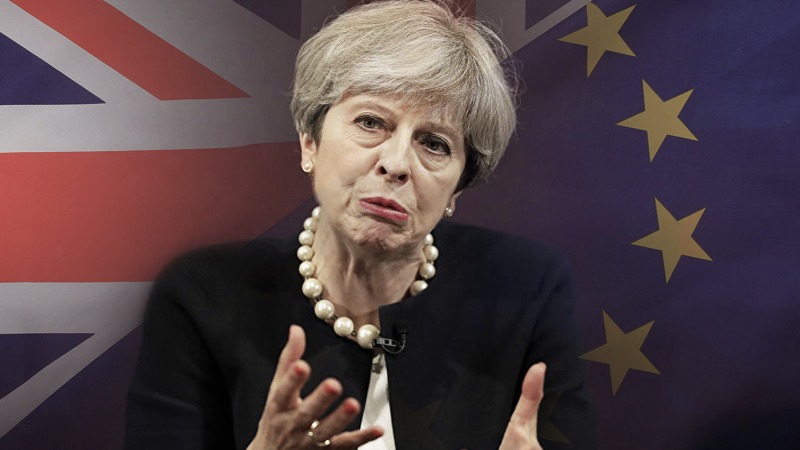The political declaration on how the EU and the UK will trade and cooperate in the sphere of safety and other areas, generally, is agreed, the European Council reports.
According to the last preliminary arrangements, the final agreement on Brexit is “within our grasp” following a breakthrough agreement on future relations between the UK and EU. Prime Minister Theresa May said that this kind of political declaration agreed upon with Brussels is “the right plan for the UK”.
The draft declaration was agreed upon in principle on Thursday. The participants of the negotiations worked through the night on new directions before prime minister May and European Commission president Jean-Claude Juncker met in Belgium. A drafted 26-page agreement could be approved by EU leaders at Sunday’s summit, with the hope that it could “build and improve on the single customs territory”.
However, fears remain that May will struggle to convince her own MPs that the proposal is beneficial. The President of the European Council, Donald Tusk, wrote on Twitter he had sent the proposal to the 27 EU members, mentioning that the proposal has been agreed upon at the negotiator level and now needs to approved by the leaders of the EU member states.
If everything goes according to May’s plan, the EU and Great Britain will use this proposal as the basis of future trade and customs agreements. The proposal has to be approved during a 21-month transition period which will begin on March 29. Throughout this period the UK will remain a member of the all-European market and the customs union. If the agreement is approved at the EU summit, then PM May will have to get approval from British parliament.
Reactions and probability of a veto
Some EU countries do not want this scenario, as it is favorable only to the UK. Such an approach reflects a “self-preservation instinct” for the Euro-bureaucrats. The European leaders are afraid of a domino effect in the future and are convinced that it could threaten the existence of the EU if they allow the British to leave, considering the UK keeps the same privileges (including access to the EU market) without needing to conform to the EU rules and regulations. Even states like the Netherlands and Denmark, whose economies seriously depend on the British, are closer to the German and French position of a veto against the current Brexit agreement.
However, Germany will vote in support of the latest agreement, Chancellor Angela Merkel said. She expects that the 27 member states of the European Union will approve of the Brexit agreement as well. The Irish parliament supports the current draft as well. The document was approved almost without objections during which the government stated that the agreements conform to all its requirements. At the same time there are declarations about rejecting Brexit in thefuture – the Minister of Foreign Affairs of Ireland, Simon Koveney, hopes that the UK will return to the European Union in the future.
Spain is currently openly against the current agreement, due to the question of Gibraltar. The most recent negotiations between Prime Minister of Spain, Pedro Sanchez, and UK Prime Minister May did not change the Spanish position. The Portuguese government considers that not reaching an agreement on the UK exit from the EU would be a tragedy for Europe, according to Antonio Costa, Prime Minister of Portugal.
Opposition in the UK
Even if May manages to work out compromises at the EU level, it does not solve the problem of the internal split threatening the UK government. The opposition Labour Party will not support the current agreement in parliament. According to the Labour Party leader, Jeremy Corbyn, the deal is “inadmissible”, and regards the negotiations of the May administration as a “failure”. “We’ll vote against this deal because it doesn’t meet our tests,” Corbyn said. “We don’t believe it serves the interest of this country, therefore the government will have to go back to the EU and renegotiate rapidly”.
The First Minister of Scotland, Nicola Sturgeon, also considered the current terms of the agreement as unacceptable. According to him, it would be a mistake for parliament to approve of the proposal, and it risked the future relationship of the UK and EU. If rushed, he said, it would “lack precise detail” and simply defer the risk of a no deal until a later date.
Bargain – to be continued
The European and UK bureaucrats have been following the strategy of trying to rush the other side and pressure extreme decisions in order to intimidate and bluff each other to achieve desirable concessions. Certainly, the art of this strategy is not to go too far.
Unlike Alexis Tsipras, Foreign Minister of Greece, who did not want to even mention the issue of a no-deal Brexit, Theresa May charged to the government that it must be prepared for no-deal Brexit consequences (no-deal Brexit meaning an exit from the EU without a formal agreement for a future relationship). The main complexity consists of the restoration of the border between Northern Ireland and the Republic of Ireland and the questions of the customs union.
The problem is that the logic of the “hawks and pigeons” game consists more of trying to make your opponent capitulate rather than working out a compromise. The main goal of globalists who refer to the “tragic experience of Greece” and others is to show that the country now must suffer the grave consequences of trying to leave the European Union and defend independent policy.
















Leave a Reply